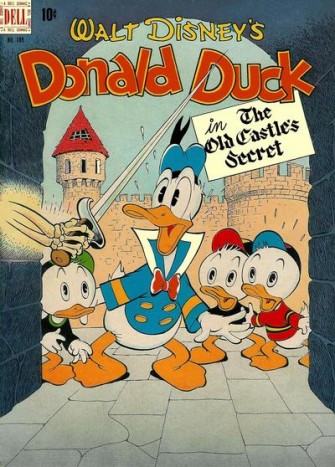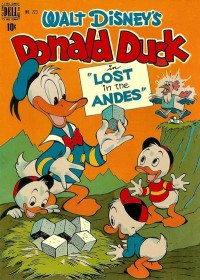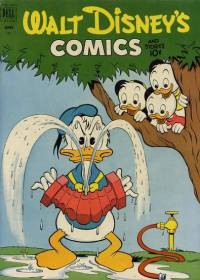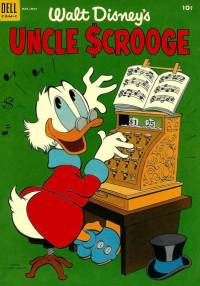
January 11, 2011
 A Few Notes On The Fantagraphics Carl Barks Duck Comics Announcement
A Few Notes On The Fantagraphics Carl Barks Duck Comics Announcement


So due to a confluence of how sources uncovered the story and the timing of the
Robot 6 blogiversary, the biggest publishing news in quite some time ran on a Sunday in very early January, a date so odd and little-observed as a potential fount for publishing event announcements that even many of us that follow comics as part of our jobs were a day late on picking it up. Great story, though:
Fantagraphics has acquired the rights to reprint the works of the great Carl Barks starting in Fall 2011. These will be hardcover volumes, 200 pages or so, in color, archival and support material added to the comics presented, at a price point of $25 (which means that a standard bookseller discount or an on-line bookseller discount will put this material at less than $20). This is stupendous news no matter when it's announced, but I think it's also fair to say that it's not just another "Oh boy! More great comics!" story. We live in such an amazing time for comics publishing that it's easy to let yet another announcement about another pile of amazing funnybook material flash by. Maybe we shouldn't always let that happen.
This announcement is different, I think, in a few ways.

1)
This is primarily a republishing project, not an archival one. Fantagraphics is employing a strategy they've used on
their Krazy Kat series to schedule their Barks books in a way that puts some of the best-regarded material out there and into people's hands as the series launches rather than when chronologically permissible. They're starting with
Lost In The Andes!, which as Barks' favorite, an early highlight of his work with the ducks, and as a story with which people are generally familiar (they know about the square eggs, anyway) seems to have a spiritual and logical claim to be first at bat. With the second, they go straight into the Uncle Scrooge material. Fantagraphics seems to be betting on the material connecting with people on its merits, above and beyond the historical or collectors' interest in these comics. This isn't a bad gamble considering how good these comics are.
2)
As a republishing project, they have a chance to provide effective production rather than historically reminiscent production, and a very good cartoonist gets a regular freelance gig for a while. A minor couple of points, I know. While I'm not the guy to point out which kinds of coloring techniques work with old comics and which ones don't, it seems to me that in a lot of comics archival projects how the material is reproduced becomes a huge issue, particularly in the way the colors survive whatever process is employed. Focusing on republishing the material with the original color comics as guides sidesteps that issue a bit. I don't know how well it will work, but notorious grouch and publisher
Gary Groth felt strongly enough about the re-coloring to report positively on what's come through the pipeline so far, and he's not the kind of guy that would put himself out there as a show of support he didn't feel was earned. I'm also happy true comics warrior
Rich Tommaso has a first-class craft gig in a field that doesn't really offer up a whole lot of them.

3)
The publishing news story isn't where this stands in the history of Barks reprints, but where it stands in the history of the comics marketplace. I ran across a few articles on the announcement that insisted on placing Fantagraphics' forthcoming series in a continuity with past archival reprints of this material. Those efforts were great things, too, don't get me wrong. As a young comics reader I first encountered Carl Barks in one of the many comic books in which his work was reprinted, and as a one-time full-time employee of a comic book company with an easily accessible library, I'm among those that got to read the vast majority of Barks' output in crisp, snappy-looking editions. I cherish both experiences.
However, I would suggest what's key about this project isn't whether or not this material has ever been reprinted before, or even that's it's simply being reprinted again, but that Fantagraphics' effort will mark the first time maybe since these comics' original publication that the material will hit the marketplace in a popular, accessible, dependable form. In other words: the Barks ducks comics were originally published at a time when most devoted readers of such material read comic books; they were subsequently published in random comics and in archival editions that reached different hardcore comics audiences; they're now going to be published where most devoted readers for such material engage with comics in the form of competitively priced books with spines. This also represents a chance for the Barks books to be purchased by libraries where they can enjoy a longer life passing between many hands. Because of their dependence on hand-selling, mail-order and an active backlist, boutique publishers like Fantagraphics do a generally fine job of keeping material in print for years and years, while some bigger publishers might not. With a 15-year publishing window, if the material finds an audience there could be two generations or more that enjoy these comics this way. It even makes a digital release at some point more likely, I bet. We're getting Carl Barks back as a regular, season-to-season market presence, and I couldn't be happier.

4)
There is a host of material to discover here. It would stand to reason that with fifteen 200-or-so page books in the series, Fantagraphics is bound to reprint material that most people either haven't seen at all, or haven't seen in quite some time. I think that Barks' particular blend of strong character work, satire through observation, and killer pacing might potentially be appreciated for its own thing in an era where a lot of popular comics have moved away from those values. I also think there are many people that misapprehend the parameters of Barks' contributions, too, favoring memories of the longer adventure stories to a significant extent over the sublime ten-pagers. In fact, as we saw when on
Kim Thompson's insistence the
Donald Duck comics (#9) were placed on the
Comics Journal top 100 list of the 20th Century ahead of the
Uncle Scrooge material (#20), it's unclear whether even smart fans know what kind of comic Barks was doing for which title and what was specifically good about them. I'm looking forward to reading this material and to apprehending it, not just owning it and having it on the shelf.

5)
The deal says a lot that's good about comics publishing right now. It's hard not to see the acquisition of this license -- and the Floyd Gottfredson
Mickey Mouse material before it -- as a vote of confidence in Fantagraphics' effectiveness and skill with some of their other licensed books, particularly the
Peanuts series. In an industry that frequently staggers towards the most crass, chummy and short-term-advantage partnerships, it's nice to see that past performance and quality matters when publishers like Fantagraphics,
Drawn & Quarterly,
Boom! Studios,
Top Shelf and
NBM sign projects based on previous successes. I'm not in a place to say that this deal definitively reveals something about Disney's relationship to Marvel -- the notion being that it reveals they're more interested in Marvel as a intellectual property farm than as a publisher -- but it does suggest that Disney sees the value in specific publishing partnerships for specific sorts of projects. In other words, I think these kinds of deals are good news for both of the partners in them, as opposed to a more rigid general policy that stresses a kind of corporate parochialism.
6)
This move should further stabilize Fantagraphics. Publishing art comics will never be a way to make buckets and buckets of cash, even with lucrative partnerships. This is doubly true of Fantagraphics, which, unlike newer publishers, has to endure the occasional growing pain that comes with having established itself two or three seismic market shifts ago. As far as I can tell, no one at my former employer got a significant bank-account boost when the
Peanuts books began to hit. It seems to me instead that that series gave the publisher some ballast, especially in terms of where they might be without that success grounding their monthly operations and making possible some of their deliciously odder efforts. While they've admirably pursued a variety of projects that probably scraped to make their money back -- I mean, my goodness, they publish
Joe Daly -- they've also done a pretty good job with some comics projects that have a devoted, outside-of-comics relationship. With
Prince Valiant and their work with
Bill Mauldin, Fantagraphics may be slightly past the era in which these books might have automatically sold to a huge number of greatest-generation consumers that otherwise wouldn't look at a comic, and with the Barks books it may be necessary to inculcate audiences as to what makes those comics worth reading above and beyond the consumption of other Disney cartoon and even comics efforts, but one reason these are first-class projects to which we pay attention is because a potential audience is there, even that relatively modest one.

7)
Don't look now, but Fantagraphics just put something on the schedule for its 50th year. At 30 volumes released very six months or so, the Barks series will apparently last some 15 years. As 2011 is the publisher's 35th in existence, I think that means that final volume will come in the year of the alt-publisher's half-century birthday. I have no idea what will happen to the company or the industry -- heck, the world! -- between now and then. Co-publishers Gary Groth and Kim Thompson, if they're still working then by choice or by fate,
will be pushing 70. I just thought it worth mentioning. The nastiness of comics' re-establishing itself as a medium for all people rather than just a few readers that earned the right to be here through close study and/or devotion to the One True Genre, when combined with the immortal-seeming aspects of the medium's iconic characters has strangely diminished the achievements of its institutions not plugged into the widest possible public zeitgeist. I remember when one publisher hung it up after an astonishing 20-year and more run, people I know not a fan of their work quickly branded that company a failure. Even
those deluded souls would have to admit that any publisher with a chance of surviving a half-century has done something worth noting, ten times that for essentially starting out behind a teenager's closed door, a kid hammering away on a typewriter where you had to count the spaces each line would take up so the margins could be made to match. 50 years. It kind of blows me away, anyway.
posted 10:00 am PST |
Permalink
Daily Blog Archives
November 2019
October 2019
September 2019
August 2019
July 2019
Full Archives


